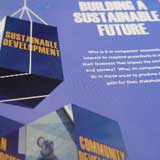

Column for Forbes special supplement on CSR
Pushing into the Mainstream
Have you watched two great tributaries converging to form a single river? If the incoming waters are of different colours, you see extraordinary, chaotic patterns forming as currents collide and mix. In some cases, the process continues for many miles downstream. The same is true of great social movements as they push into the mainstream of politics and business. But when convergence really gets going, expect turbulence and a blurring of boundaries, making underlying trends harder to detect and read. 2003 has seen precisely these conditions as the corporate responsibility agenda has mutated and pushed into the political mainstream.
The Bush Administration's push-back against non-governmental organisations (NGOs) is an interesting action replay of the Reagan and Thatcher years. But ultimately the flow of history is unstoppable. Driven by globalization and increased transparency, the world of corporate citizenship and social accountability is overlapping that of corporate governance. In the process, intense eddies are forming around concepts like corporate social responsibility (CSR), expanded notions of human rights and - most ambitiously - sustainable development (SD).
2002's World Summit on Sustainable Development (WSSD) was not the political breakthrough the UN and its partners hoped for, but it served notice that successful globalization requires business to embrace new notions of responsibility and governance. This is not simply backwash from recent corporate scandals: it is a logical, inevitable consequence of social trends that have been building since the 1960s.
Three great societal pressure waves have impacted markets since 1960. The first two peaked between 1969 and 1973 and 1988 and 1991, the first focusing on new policies and regulations, the second on new market mechanisms and competitive advantage. Those waves were largely environment-focused, whereas the third (peaking 1999-2002) went much wider, focusing on responsible globalisation and governance, both global and corporate.
As a result, such issues topped the agenda at the 2003
annual meeting of the World Economic Forum (WEF). One WEF session I facilitated
was entitled 'How much CSR is too much CSR?'. An interesting question, but
most participants accepted that the challenges for major corporations are
entering a new phase. Many CEOs now accept that the successful resolution
of these issues is strategic, both for their companies and for capitalism.
Company directors ignoring issues like climate change are potentially in dereliction
of their fiduciary duties. Inevitably, boards encountering the new market
conditions may feel sea-sick for a while, but few can doubt that the influence
of this great river of change will be felt way out into the wide expanses
of 21st century markets.